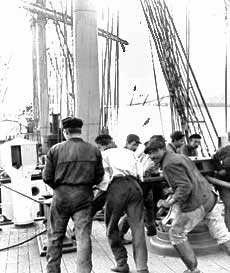Mike Blackburn
Working the Waters
Essay3 BillyBudd
What can be gleaned from this overly verbose tale? The common sailor can’t comprehend complex issues of crime and punishment, and justice? In trying times a man was put to death unjustly? The needs of the ship and the empire outweighed the needs of the individual? A sad story it was but it did offer a unique perspective into what was the condition of British Navy life onboard a ship in the late 18th century. The threat of mutiny was too apparent to risk the pursuit of justice with this disheartening conundrum of a happening. In difficult times a martyr was made of Billy Bud and the soul of Cartlager should burn in hell for his fastidious greed and fervent vanity. Something was amiss; the punishment did not suit the crime. Captain Vere knew this and I believe said so to Billy Budd in his private, forever secret meeting with him after the council reached its verdict. The circumstances as they were in 1797, were the driving force behind Billy’s execution. If ignorance is bliss yet you are still accountable for your actions, what of naiveté? To avoid further conflict and to uphold the maritime disciplinary system Billy Budd had to die.
1797 was widely considered the year of the mutiny; British Officers were especially worried of the threat of revolt on their ships. The Admiralty was concerned as well because Britain was at war with The Revolutionary Government of France. The mutinies at Spithead and Nore both involved fleets and even blockades of London, several other mutinies occurred throughout the year involving single ships. These occurrences served well against Billy Budd who was quite misfortunate to be accused of mutinous activity at this particular time.
Today, Billy would most likely be convicted of manslaughter or accidental homicide. This is conjecture, but these crimes don’t warrant capital punishment. Under the same circumstances on land, a court of his peers might of come to a different verdict. Execution seems to be more a demonstrative than deserving punishment. Billy was a martyr of sorts. Acknowledging Captain Vere as a great captain and willing fully dieing, his death was unjust and unnecessary yet the crew did not mutiny so his death was useful in a sense. It could be said that the life of Billy Budd was worth the prevention of a mutiny.
The drumhead court, called by Captain Vere, the sole witness, deliberated over the issues involved in this case. Despite what happened the court determined that the law didn’t have any room for bending. Billy as handsome as he was would die. He killed a superior officer. No matter what his intentions or previous good will, the law would be upheld; Billy would be made an example of because of the threat of mutiny.
It might have been different if Billy hadn’t been accused of mutiny by Claggart or if there were more witnesses. What if one of his peers witnessed the misfortunate event and could testify to its accuracy? The crew would maybe be able to honor and accept the testimony of a fellow tar. The fact that the Captain was the sole witness heightened the threat of mutiny. The crew might exploit any weakness the officers showed in the normal disciplinary system. A disciplinary system that wasn’t just but it was useful in keeping the labor force in line.
Billy died, there was no mutiny, his death wasn’t pointless but maybe it was. Was the crew going to rise against the Captain? We might never know. There was a utilitarian purpose to his death. Once again when it comes to life on the ocean the good for the individual comes second to the good of the group. The drumhead court might rightfully have made the correct decision in executing Billy, yet morally his death was despicable and unsettling. Captain Vere’s last words “Billy Budd, Billy Budd” vaguely allude to the inner turmoil Captain Vere felt about” his execution.
